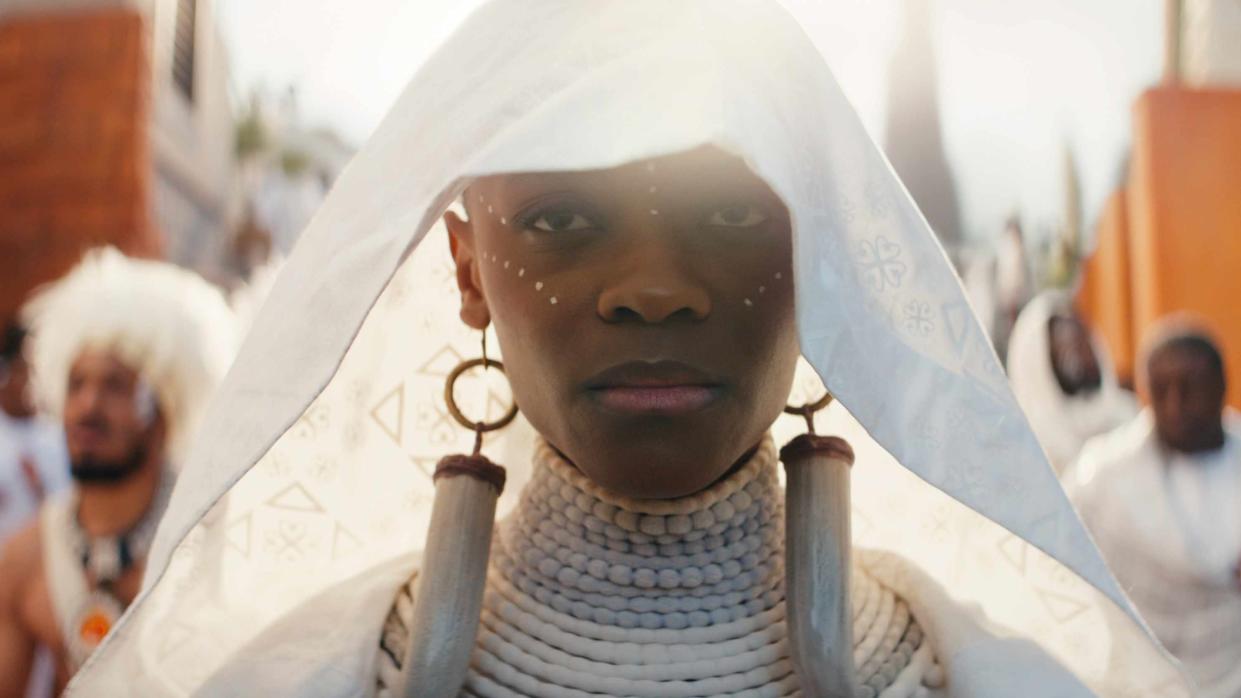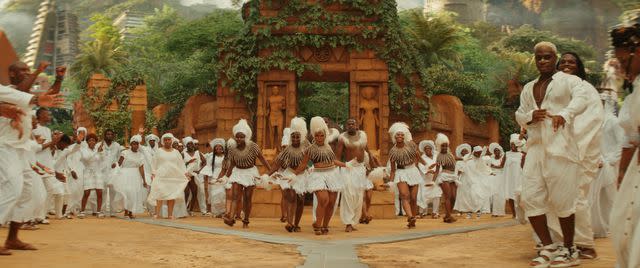'Wakanda Forever' Perfectly Captured Afro-Diasporic Mourning
The latest Marvel film may be set in a world of fantasy, but the traditions shown at T'Challa's funeral are deeply rooted in real life.

Marvel Studios
From the moment Wakanda Forever opens, audiences are thrown into a frantic scene. Shuri is trying to save her brother, T'Challa, but to no avail. He has gone on to be with the ancestors. What followed was something that I immediately recognized, as I assume others of the African diasporas understood, too: a homegoing ceremony. The ritual itself does not take place in a temple, church sanctuary, or any other kind of institution, but rather, a forest. As a descendant of the enslaved, I thought about what forests represent on American soil. Forests were where the Black American enslaved would run in order to escape their masters. Forests were also where the Black American enslaved would hold and retain their traditions away from the plantation and all of its horrors. But this was Wakanda, an uncolonized land. I had to think deeper.
Wakandans are eco-conscious and mindful that Vibranium, their most precious resource, needs to be kept as safe as possible. Wakanda is a place where trees are abundant, even as vehicles fly through the sky, and artificial intelligence works with the human mind. Everything is connected and interrelated, which is one of the most important elements of African cosmology — forests and water are where those of the diaspora can have a direct line to the divine. Wakanda's influences could have been from the Ifa, or Yoruba, religion, where in Nigeria, there is a shrine dedicated to one of its many orishas or the sacred forests of the Vodun religion in Togo and Benin. It is within nature that an individual becomes attuned to higher frequencies in order to petition, celebrate, and, of course, mourn.
The second element of this homegoing ritual was the pouring of libation for T'Challa's life. Before I became knowledgeable about African spiritual traditions, I used to see rappers pour alcohol out for their loved ones and thought of it as nothing more than a trend. I could not have been more wrong. When someone dies, pouring a libation on the ground, water in T'Challa's case, is an acknowledgment of the loved one who has now become an ancestor. This tradition, whether it be in rap videos, Wakanda Forever, or private religious ceremonies, stems back hundreds of years in traditional African societies. It is a way to show honor and recognize that that person is still among us. Queen Ramonda, played by Angela Bassett, says it perfectly in a later scene, telling Shuri, "T'Challa's dead, but he's not gone."

Marvel Studios
:
Finally, there is the wearing of white. For weeks, there has been a campaign for moviegoers to wear white to Wakanda Forever, a movement that could not have been any more spiritual. The veneration is twofold: We are exalting the life of T'Challa as well as the life of Chadwick Boseman, who died at the young age of 43 due to colon cancer. His death was a shock to people around the world, as many did not know he was sick, not even his co-workers. What made his death especially impactful was that COVID-19 was ravaging the world. Many of Boseman's fans, particularly Black and brown people, were losing loved ones at disproportionate rates back in 2020 because of this disease.
So, for someone like Boseman, who captured the hearts of millions of the diaspora with a performance just two years prior that made us reimagine what our lives are (or could be) divorced from oppression, to leave this earth so soon was a visceral blow. Like many of us in the real world, Wakandans squabbled about how to move on and pick up the pieces after such a monumental figure's passing.
:
But when Queen Ramonda and Princess Shuri walked behind T'Challa's casket in a procession through Wakanda's main square, they were greeted by white-clad citizens who were not weeping and screaming but rather smiling and dancing. As Queen Ramonda says in a later scene, "Death is not final." This is a phrase uttered everywhere, from Black churches to Afro-diasporic faiths around the world. White is worn during Christian baptisms, New Year's Eve rituals from Candomblé believers in Afro-Brazil, Santéria initiations, Voduisants during ceremonies, hoodoos doing ancestral work. Wearing white signifies the purification of the mind and the cleansing of the body. More than that, white is an extremely significant ancestral color for Black people.
White is commonly worn when petitioning or communicating with the ancestors. Therefore, it makes sense why Wakandans wear white during T'Challa's funeral. He is now an ancestor, and this ceremony is the proper way for him to journey upwards into the ancestral realm, which the movie alludes to when his casket is lifted into the sky.
Wakanda Forever is different tonally from Black Panther. However, the former arguably is more cosmological in its philosophy than its predecessor. In Black Panther, we learned about the physical realm: Wakanda, America, vibranium, and family dynamics. In Wakanda Forever, we move into the shadowy side of the natural cycle of order, which is the spiritual: the ancestors, grief, ritual, succession, and healing. Both films beautifully incorporate the ancient part of ourselves that is a throughline to the motherland. Wakanda may not be real, but its traditions could not have been more authentic.
:
For more InStyle news, make sure to sign up for our newsletter!
Read the original article on InStyle.
